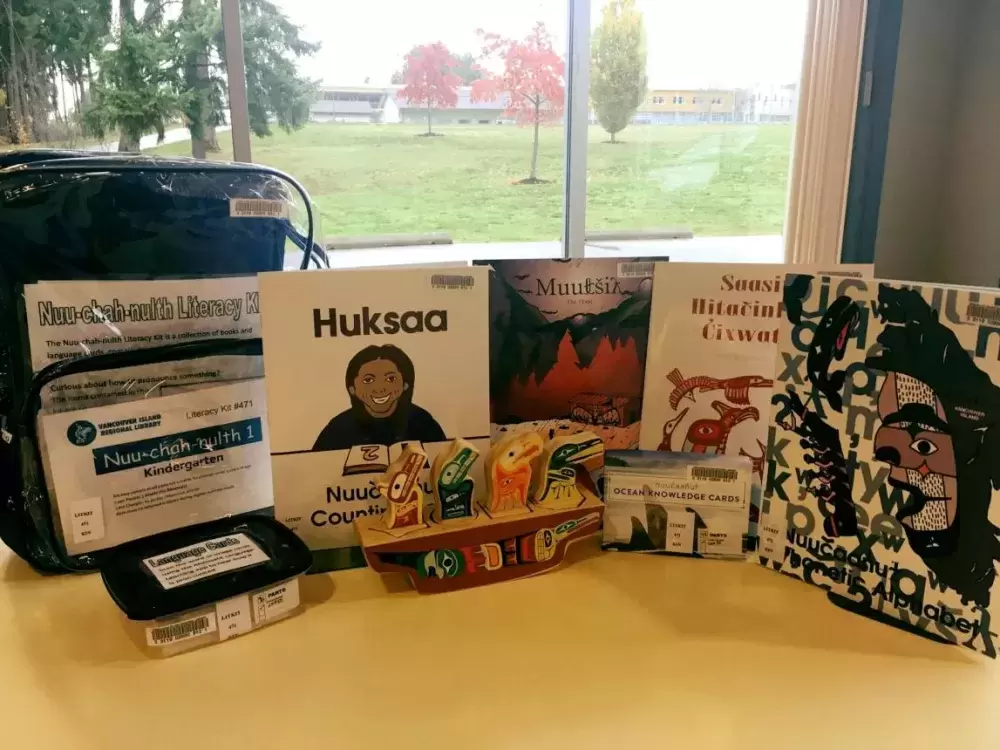An exciting new language learning kit is now available at the local Vancouver Island Regional Library (VIRL) that brings Nuu-chah-nulth language learning to the next level – by allowing the user to hear words pronounced by a fluent Nuu-chah-nulth speaker.
The Nuu-chah-nulth Literacy Kit is filled with resource materials developed by other Nuu-chah-nulth people and some by Eva Prevost. There are children’s booklets and language cards. In addition, the user may download an application to their mobile device that works with the kit material. The app allows the user to point their device to a Nuu-chah-nulth word and when it recognizes the word, the user will hear a recording of a fluent Nuu-chah-nulth speaker saying the word. “It’s like having a fluent speaker right in your home,” said Prevost.
Developer Eva Prevost says her work on the Nuu-chah-nulth Literacy Kit is part of a revitalization project offered through the University of Victoria.
Prevost, 36, is an Ahousaht member. She is about to complete UVic’s Aboriginal Language Revitalization program, earning a certificate after about a year of studies. No stranger to post-secondary education, Prevost also successfully completed a business administration program and an electronics and computer engineering technology training program.
She describes herself as a language activist who works with other language activists toshare what work they are doing.
When she’s not working at her regular job, Prevost devotes her time to the Nuu-chah-nulth language project. “Taking the Aboriginal Language Revitalization program allows me to work on projects that I’m passionate about,” said Prevost. Part of her ongoing work is meeting with fluent Nuu-chah-nulth elders to record their words.
“I do love our language,” she said. Prevost has worked in schools and has learned fun ways to teach children the Nuu-chah-nulth language. Aware that older kids are into technology, she looks for ways to bring the two worlds together.
Prevost learns language from her grandmother, Katie Fraser. She also took part in a language mentorship program where she was paired with Ahousaht elder Ruth Paul. “Ruth was my mentor and I was the apprentice,” Prevost explained. The experience provided an opportunity for Prevost to attend a language conference with Paul where she learned about an application that helps people learn languages.
The application is called Aurasma and it allows users to hear the proper pronunciation of a given word.
For example, the flash cards in the Language Learning Kit have been programed into Aurasma by Prevost. After a user downloads the app onto their device they launch the app then point the camera to a flash card. When the application reads the flashcard it plays a recording of a Nuu-chah-nulth person correctly pronouncing the word on the card.
Prevost said she heard Lindsay Haggard, Tseshaht, talking about labels as language learning tools. “We had a dream of having labels around the house, then you point your mobile device at them and it plays a recording of the word,” said Prevost.
The Aurasma tool could bring this dream to a reality. But first the app needed to be loaded with images, words and recordings of Nuu-chah-nulth speakers saying the words. It would take time, effort and money.
She approached VIRL librarian Robin Kelly with the idea of developing language learning kits and gained support.
They also approached Tseshaht’s Haahuupayak School because they had their own language materials developed. They have primary school booklets and tapes that go with them. After gaining the Haahuupayak School Board’s approval to use their materials in the kit, Prevost says learners can use the Aurasma App to hear the proper pronunciation of the word in the Haahuupayak School’s counting and alphabet books.
Also in the kit are Nuu-chah-nulth language flash cards relating to emotions that was developed by Prevost and Katie Fraser. They also made flashcards of Nuu-chah-nulth names for animals, household items, and daily commands like come in or sit down.
Prevost hopes to build on the database for Aurasma by including more resource material developed by other Nuu-chah-nulth nations. She is also considering adding words contained in existing Nuu-chah-nulth dictionaries.
“I hope that this is a start to more innovative ideas to get people immersed in the language,” said Prevost. She noted that many people don’t have quick and easy access to the elders.
“This is a start to get more language tools out there,” she said.
The Aurasma App can be used on both Apple and Android devices and is free to download. According to Prevost, once you download the app, it stores the information on your device so you don’t need a constant connection for it to work.
This is important, she says, because some remote communities don’t have Wi-Fi.
The Nuu-chah-nulth Language Kits were made possible through funding from the NEDC’s (Nuu-chah-nulth Economic Development Corporation) Endangered Language Program. There were several elders and Nuu-chah-nulth schools and First Nations that have contributed to the project.
Ocean Networks Canada donated flash cards and the Port Alberni Friendship Center donated printing and lamination services.
The kit is free to borrow from VIRL, but it has proven to be so popular that there is a now a waiting list.







